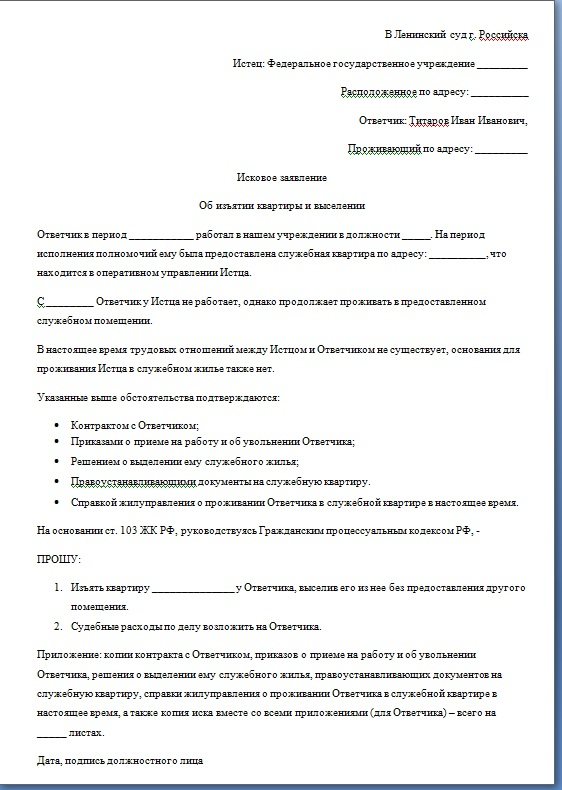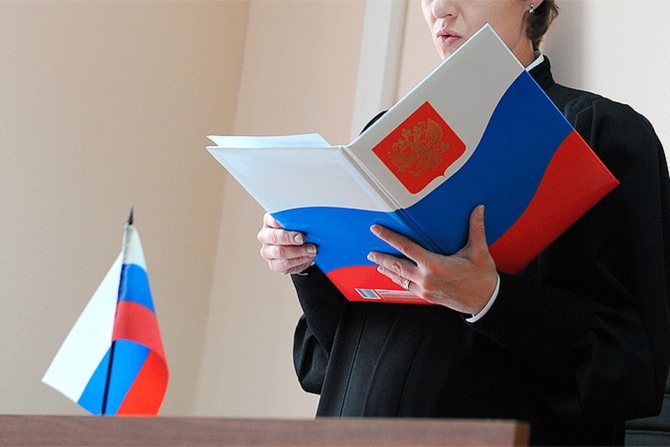Home » Housing disputes » Eviction of minor children from residential premises
3
Minors are one of the most vulnerable categories; until they reach adulthood, they have virtually no opportunity to independently solve their problems and protect their rights. According to the law, the protection of the rights of the child is entrusted to parents or guardians, but, unfortunately, not all parents can fully take care of their child, therefore, the law establishes norms that protect some of the rights of minors. This is especially true for the rights of a child when evicted from a residential premises.
Is it possible to evict a child from an apartment if he is registered there?
Yes, a minor can be evicted, either by court or at the insistence of the parents, especially if the residential premises from which the child is supposed to be evicted is privately owned and the minor himself does not have a share in it.
But a mandatory condition must be met: a minor can only be evicted to another residential premises. That is, it will not be possible to simply evict a child to the street, to nowhere.
It will also not be possible to forcibly evict a minor from municipal housing; the guardianship authorities will not give such consent under any circumstances. A child can move out of their municipal apartment only after his mother’s voluntary deregistration.
Who has the right to evict from a mortgaged apartment?
Eviction from a mortgaged apartment can be carried out either by bailiffs or by the creditor himself, on the basis of a court decision (Article 55 of the Federal Law No. 102 provides for the eviction of a debtor from a mortgaged apartment by the creditor if this condition is specified in the agreement). When a debtor is evicted by bailiffs, Federal Law No. 229 applies; the seizure of the mortgaged apartment occurs as part of enforcement proceedings. Based on Art. 107 FZ-229, the bailiff must notify the debtor of the voluntary release of the mortgaged apartment no later than 10 days from the date of receipt of the written notification. If this requirement is ignored, the debtor is given a second deadline with an enforcement fee.
The eviction procedure takes place in the presence of witnesses and police officers; if necessary, the bailiffs have the right to call the Ministry of Emergency Situations officers to vacate the apartment. The bailiff can provide the debtor with the service of transporting and storing personal property for a period of no more than 2 months. If the eviction is carried out directly by the lender, this procedure is carried out by agreement of both parties. If the debtor still refuses to vacate the mortgaged apartment, eviction will take place in the presence of prosecutors in an administrative manner or through the court.
Important! Any actions to evict a borrower-debtor from a mortgaged apartment without a court decision can be challenged by the debtor in court with satisfaction of his demands.
Is it possible to evict the mother of a registered minor child?
Yes, the law provides for such a measure, but only if the mother is deprived of parental rights and only by court decision. In other cases, everything will depend on a number of circumstances, including:
- who is the owner of the residential premises where the child and mother live;
- what kind of relationship develops between former spouses in situations where a married couple is divorced, but the spouse continues to live with the child in the husband’s apartment;
- is there registration, is it permanent or temporary;
- whether the mother has alternative living space;
Each specific situation is individual and is considered in the same way, on an individual basis.
For example, if a mother and child live in her husband’s apartment, and she is experiencing some financial difficulties, then the guardianship authorities will not allow the mother to be evicted from the living quarters if this to some extent violates the rights of the minor.
Reasons
Most often, the following circumstances become grounds for eviction of a minor:
- The owner of the residential premises intends to sell it.
- The parents' temporary registration has expired, and the owner does not intend to renew it.
- The parents of the minor are registered at a different address.
- The child has ceased to be a member of the apartment owner's family.
As stated above, a child cannot be evicted anywhere; according to the Civil Code of the Russian Federation, a child is moved to a residential premises where his father or mother is registered for a given period of time.
Eviction of a child from a privatized apartment
From a privatized apartment that belongs to the parents of a minor, a child can only be evicted to another residential area.
The reasons may be different:
- moving to another locality;
- sale of apartment;
- parents buying a new apartment or house.
During such an eviction, the guardianship authorities carefully ensure that the new living conditions are no worse than the previous ones.
For example, in the old apartment the child had his own separate room; in the new living space, parents cannot allocate a separate room for a minor. In this case, it is unlikely that it will be possible to obtain the consent of the guardianship authorities.
But often children live with their parents in residential premises that do not belong to them. This may be an oral agreement with the owner of a privatized apartment or a rental agreement for residential premises. After some time, the owner decides to terminate the contract (for various reasons) and evict his tenants. What actions should be taken and in what order?
Procedure
Step-by-step instructions for evicting a minor from a privatized residential premises:
- Determine what grounds for eviction exist. This could be the sale of an apartment, a change of residence, the termination of family ties, etc.
- Prepare documents for the guardianship and trusteeship department to prove the legality of the eviction of a minor.
- Visit the guardianship authority, where you write an application asking for permission to evict the child. Hand over all collected documents to department employees.
- Obtain the conclusion of the OOP. The document must be signed by the head of the local municipality or his deputy.
- Draw up a statement of claim demanding the eviction of a minor from a residential premises, attach to it a receipt for payment of the state duty and all collected documents.
- Submit the entire package of documents along with the statement of claim to the court at the child’s place of residence.
- Take part in the trial, where you will justify your position on the eviction of the child from the point of view of Russian legislation.
- Get a court decision.
- In case of a positive verdict, visit the district office of the Federal Migration Service, where the minor will be discharged (based on a court decision).
It is not always possible for the owner of a residential premises to evict a minor, even if he is not a family member or a co-owner of the apartment.
For example, the owner of a privatized apartment Ivanov I.P. under a residential rental agreement, he registered citizen O.V. Nikolaeva in his residential premises. with a minor child. A few months later, the owner decided to sell the apartment and notified his tenant about this in advance. But the latter categorically refused to move out, citing the fact that she had no other place to live.
Ivanov decided to evict the intractable Nikolaeva in court, for which he applied to the department of guardianship and trusteeship to obtain permission to evict by court decision, but the PLO refused Ivanov’s request. The basis for the refusal is as follows: since Nikolaeva O.V. there is no other alternative housing, then her minor child cannot be evicted along with his mother simply to the street.
Statement of claim
The text of the statement of claim for the eviction of a minor must contain the following points:
- Name and details of the judicial authority to which the claim is filed.
- Personal information of the plaintiff and defendants.
- Information about third parties involved in the process, for example, POO.
- Description of the current situation.
- The reasons why the plaintiff intends to evict the minor.
- Evidence in support of the validity of the applicant's claims.
- Claims, for example: to deregister and evict a minor child.
- List of all attached documents.
- Date and signature.
Sample statement of claim for eviction of minors
Documentation
An approximate list of documents for a claim for eviction of a minor:
- copies of the statement of claim (according to the number of parties to the process);
- photocopy of the applicant's passport;
- permission to evict a minor from the guardianship and trusteeship authorities;
- photocopies of birth certificates of all children under fourteen years of age and passports of older children;
- any title documents for residential premises;
- certificate of ownership of the apartment;
- a certificate from their Criminal Code, housing and communal services or an extract from the house register;
- any documents proving the competence of eviction of minors;
- receipt of payment of state duty.
All documents, except the receipt for the state duty, are transferred to the court office in copies (the receipt must be in the original), but the plaintiff will have to provide the originals to the judge for review during the trial.
Cost and terms
The eviction claim is non-property, so the state fee will be 300 rubles.
Typically, citizens' appeals to the PLO are considered within two weeks; consideration of an eviction claim will last two to three months. If a positive decision is made, the termination of the right to reside in residential premises will take two to three days. Thus, the total time to evict a minor from a residential premises by court will take at least three months.
Eviction of minor children from residential premises
- Decide on the grounds for discharge (sale of an apartment, termination of family ties with a child, change of address).
- Prepare evidence of the legality of eviction for the guardianship authority.
- Visit the PLO office and write an application according to the established form.
- Provide documents to the guardianship authority.
- Receive a PLO conclusion signed by the head or deputy head of the district administration.
- Draw up a statement of claim for the eviction of a minor from an apartment (we will look at a sample below), pay the state fee.
- Submit the documents and the statement of claim to the secretary of the court office, receive a coupon confirming the acceptance of the package.
- Attend preliminary and main hearings, justify your position from the point of view of legislation.
- Contact the court office for a copy of the order.
- Visit the district department of internal affairs and discharge the child from the apartment (if the procedure is voluntary, you can discharge the minor through the State Services portal or through the MFC).
We recommend reading: Apartments for rent for a day in St. Petersburg
Eviction of a minor from a mortgaged apartment
Usually, when buying a home with a mortgage, until the loan is fully repaid, the apartment remains pledged to the bank, that is, in fact, it belongs to the credit institution.
In cases where the parents of a minor for some reason do not make mortgage payments, the bank, as the owner of the residential premises, has the right to evict unscrupulous clients from the apartment. Moreover, in this case, the owner can evict both adult family members and children, since according to the Civil Code of the Russian Federation, minors under fourteen years of age must live with their parents.
Eviction of minor children from a mortgaged apartment is possible only through the court. A representative of the PLO and the prosecutor must necessarily participate in the court hearing.
If the family does not have any alternative housing, an obligation to provide smaller housing in place of the mortgage may be agreed upon.
For example, the Ilyin family, which has a three-year-old child, bought a three-room apartment with a mortgage. For several years, the head of the family regularly repaid the loan, but then gradually the family’s income decreased and payments stopped.
The bank repeatedly notified the defaulter of the need to repay the loan debt, but the Ilyins did not have the means to fully fulfill the loan obligations.
The credit institution's lawyer contacted the Public Prosecutor's Office to obtain permission to evict the minor. A specialist from the guardianship and trusteeship department visited the Ilyin family, where it was determined that the family had no other alternative housing and no money to repay the loan.
The PLO issued permission to the banking institution to evict the minor with the condition of providing him with alternative housing.
Since part of the loan had already been repaid, at the court hearing the bank representative offered the Ilyin family a one-room apartment instead of their three-room apartment, with the loan reissued for a much smaller amount in order to repay the remaining unpaid small part of the cost of the one-room apartment.
The court ordered the Ilyin family to move from a three-room apartment to a one-room apartment with much lower costs for repaying loan obligations.
In this case, the court deliberately decided to worsen the living conditions of the minor, taking into account the Ilyins’ inability to repay the mortgage in the same amount.
Features of eviction with minor children
When it comes to a mortgage, the eviction of a minor child is in practice carried out under standard conditions. The enforcement procedure is applied, the child is deregistered with the Federal Migration Service.
The only thing a debtor can do in such a situation is to ask for government assistance under the Housing system. There he will be given housing after he receives the “low-income” status.
When a minor is evicted from a residential premises, a prosecutor is always involved in the case. He monitors to ensure that there are no illegal activities.
Eviction of such a citizen from housing is possible only by court. Not only the prosecutor, but also the representative of guardianship and trusteeship participates in the case.
Thus, children are evicted along with their parents and other family members - no special privileges are provided in this situation, the law is the same for everyone.
It is worth noting that eviction from mortgaged housing with maternity capital is carried out on the same grounds. So the borrower should not be brought to such a situation.
Be sure to read it! An apartment with a mortgage - how to divide during a divorce in 2020?
Evicting a child from a municipal apartment
It is almost impossible to evict a minor from a municipal apartment if the family lives there on official grounds. The law allows eviction only in cases where the child is guaranteed to be placed in alternative housing.
There are several nuances:
- If the mother and father are deprived of parental rights and are evicted from the premises they occupy by court, the children will not be deprived of their apartment in any case.
- If there is a large debt in payment of utility bills, at the request of the municipality, the court may evict a family with children from the apartment they occupy, but with the obligatory provision of other living quarters.
- If a family is evicted from an unsafe living space that is dangerous for living, the PLO still controls the process in order to prevent violations of the child’s rights.
- The law allows the eviction of a minor from a municipal apartment without providing alternative housing only in cases where the apartment is completely unsuitable for living in.
For example, the Korolev family with two children is registered in a two-room apartment, but everyone lives in their own house on the other side of the city. During the absence of residents, the apartment was chosen by antisocial citizens and they set up a hangout there; the living space became uninhabitable in a short period of time.
The Kuzmin family, living opposite in a rented apartment, joined the “Help to Young Families” program and asked the municipality to allocate this apartment to them, since the location of the living space suits them (work and kindergarten are nearby), all other proposed options were far from their place of work. The young people agreed to renovate the apartment themselves if the municipality met them halfway.
A local government representative visited the Korolev family and offered them to check out of the apartment, but they categorically refused. The municipality's lawyer contacted the Public Prosecutor's Office and received permission to evict the Korolev family from municipal housing, since the family actually lives in another place, the apartment is in an uninhabitable condition, and there are arrears in paying utility bills. A lawsuit followed to evict the Korolev family.
The court satisfied the plaintiff's demands; the Queen's husband and wife, as well as their child, were discharged and evicted from the premises. The Kuzmin family received an apartment under the “Assistance to Young Families” program; moreover, the municipality helped them bring the apartment into proper condition.
Mortgage lending: eviction from a mortgaged apartment
Based on Article 78 of Federal Law No. 102 “On Mortgages,” the mortgagee’s foreclosure on the mortgaged real estate, as well as its sale, are grounds for termination of the right to use this property by the mortgagor and other persons living in the residential premises that are the object of the mortgage under the agreement mortgage lending. The new owner of a real estate property has the right to file a lawsuit in court for the eviction of all persons living in the apartment, regardless of their age, gender and the presence of a preferential category. Important! Despite Part 1 of Article 446 of the Code of Civil Procedure of the Russian Federation, which prohibits foreclosure on residential premises if for the debtor citizen and members of his family it is the only one suitable for permanent residence, this prohibition does not apply to apartments that are the subject of collateral under a mortgage loan agreement (Article 334 of the Civil Code of the Russian Federation). Important! Eviction from a mortgaged apartment is possible only on the basis of a court decision!
We recommend reading: form vehicle purchase and sale agreement 2020
Eviction of children from service housing
Service housing is provided for the period of performance of official duties or to a military personnel for the duration of his service in a given garrison. Such rules are clearly stated both in the employment contract and in the residential lease agreement.
After the contract has expired or if the employee is fired before the expiration of the contract, he is obliged to move out of the office premises along with all family members, including minors.
If a family does not want to leave, the law allows for the eviction of all family members through a judicial procedure. Sometimes the court grants a deferment on eviction to find alternative housing.
Sample statement of claim for eviction from official housing

If, while living in a service apartment, the parents divorced, then in this case the same rules apply as in relation to privatized residential premises, namely:
- After a divorce, a husband and wife become former relatives, but this cannot be applied to children; a child is not a former relative.
- The law prohibits evicting a former spouse and children until the end of the contract or until alternative housing is found.
- If both parents died while living in a service apartment, then the children have the right to live in a service apartment until they reach the age of majority and cannot be evicted.
Example. Serviceman Petrov lived in a service apartment with his wife and minor daughter. After the divorce, the wife remained to live in the living quarters, and the ex-husband was transferred to another garrison. There they refused to provide him with living space on the grounds that he had not rented out his previous apartment.
Petrov repeatedly reminded his ex-wife that she had to leave the apartment, but she refused. The serviceman applied to the PLO with an application to evict his ex-wife and daughter, citing the expiration of the contract as the reason. At the same time, he indicated that his daughter’s rights are not violated, since his ex-wife has a privatized apartment in another city, where they can move.
The guardianship authorities gave permission for the eviction, and the court satisfied Petrov’s claim in full.
Can a minor child be evicted from a mortgaged apartment?
Eviction from mortgaged housing does not depend on the presence/absence of child-age tenants. If we are talking about a privatized apartment, they have no right to evict without providing other housing. The situation is different with collateral real estate. The bank is not obliged to provide the debtor and his family with alternative living space to replace the one seized for non-payment.
What advice can you give to borrowers with minor children? First of all, submit an application to the social protection institution. You will need to confirm your status as a “low-income family.” If you are in arrears on your mortgage, you should focus on the absence of your primary place of residence. Most likely, the application will be approved - the family with the child will receive municipal housing or a room in a dormitory.
It is important to note that the eviction of children from a mortgaged apartment occurs under the control of the guardianship authority and the prosecutor. Officials are always present at court hearings. Their task is to ensure that the child’s interests are not violated.
Example:
The district court considered the claim of a banking institution against the Rykov family. The family, which included a mother, father and a minor child living in the apartment, was behind on their mortgage payment. The amounts were not paid for about 7-8 months, as a result of which the borrower accumulated a significant debt. The bank’s exhortations and attempts to understand the reasons led nowhere - Rykov simply did not respond to notifications, SMS and emails.
The plaintiff petitioned the court to foreclose on the mortgaged apartment against the borrower's debt. The basis was Art. 50 FZ-102 “On mortgage (real estate pledge)”. The creditor indicated that there was a minor child living in the family, but the defendant did not even try to start repaying the debt (fines and penalties).
Having considered the claims, the court recognized the existence of a debt, the absence of valid reasons for non-payment, and the bank’s ignoring of notifications. The defendant also did not appear in court, which was the reason for making a decision in his absence (clause 1 of Article 233 of the Code of Civil Procedure of the Russian Federation).
The final decision is to satisfy the bank’s claims for a mortgaged apartment; collect housing as collateral for a mortgage; sell an apartment at auction; evict the defendant's family within the period established by law; oblige Rykov to enter into a social rental agreement and move into a municipal apartment.
To summarize, it should be noted that eviction from an apartment due to a mortgage is a serious and unpleasant matter. If the borrower does not pay the monthly installments, the lender has the right to take the case to court and demand repossession of the home for debts. Evacuation from a mortgaged apartment occurs only on the basis of a court decision. Children or disabled people registered in the apartment are evicted along with the debtor. Late payments for more than 6 months are grounds for eviction. The living space is sold at auction, and the proceeds go towards repaying the borrower's fines, debts and penalties.
If housing is the only one
In practice, there are often situations when a mortgaged apartment is the only home of a citizen.
According to paragraphs 2, 3 of paragraph 1 of Article 446 of the Code of Civil Procedure of the Russian Federation, it is prohibited to foreclose on the debtor’s only home. Judicial practice supports property immunity (Resolution of the Constitutional Court of the Russian Federation of May 14, 2012 No. 11-P).
However, it does not apply to a mortgaged apartment. If the only residential property is encumbered with a pledge, it is allowed to be sold for debts (Determination of the Supreme Court of the Russian Federation dated May 29, 2012 No. 80-B12-2, Resolution of the Presidium of the Supreme Arbitration Court of the Russian Federation dated November 26, 2013 in case No. A65-15362/2009-SG4-39) .
Example 1. LLC Commercial Bank "Moscow Lights" with a demand to evict L. (O.V.), O.M. from a mortgaged apartment. The property was pledged to the bank in connection with the conclusion of a loan agreement with citizens. The debtors violated their obligations to faithfully transfer loan payments, so the property was foreclosed on. The apartment was transferred to the ownership of the bank. The court came to the conclusion that its actions were lawful, therefore the owners are subject to eviction (Appeal ruling of the Moscow City Court dated July 20, 2012 in case No. 11-12044).
If part of the apartment belongs to a minor child
The presence of children by the owner is not an obstacle to the seizure of collateral real estate. A credit institution has the right to initiate the eviction of a minor child from a mortgaged apartment.
The Constitutional Court confirmed the possibility of foreclosure on mortgaged residential real estate for loan debts, even if there are children (ruling No. 246-O dated February 17, 2015). After the sale of the property at auction, all family members are subject to eviction.
The only thing the debtor can count on is a delay in the sale of the mortgaged apartment for a period of up to 12 months. It is provided for valid reasons.
To protect the interests of children, guardianship authorities and the prosecutor's office are involved. Their main task is to ensure that the bank does not commit violations in the process of evicting residents from a mortgaged apartment.
If maternity capital is used
Many women pay for housing with maternity capital. This money is used as the down payment for the loan. They can also be used to repay the principal debt and interest on it.
The use of maternity capital to purchase a mortgaged apartment is not regarded as a mitigating circumstance. If the owner does not pay the loan, the home is repossessed for debt.
At the same time, the bank risks receiving a court refusal to evict residents from the mortgaged apartment. The presence of the debtor's guilt is taken into account. If the debt arose for valid reasons, the collateral property is not confiscated. In such a situation, the fact of paying the loan at the expense of maternity capital is interpreted in favor of the borrower (appeal ruling of the Moscow City Court dated December 2, 2013 No. 11-39562).
Arbitrage practice
Unfortunately, there is quite an extensive judicial practice on the eviction of minors. Most often, a decision to evict is made in the following cases:
- illegal residence of a family with children in a residential area;
- parents' reluctance to find alternative housing given the available financial capabilities to do so.
At the same time, several factors influence a specific court decision in one favor or another, including:
- the child was permanently or temporarily registered in this residential premises;
- type of residential premises from which the plaintiff demands to evict the minor (municipal, privatized, official);
- child's age;
- who he lives with and where he might move.
If you carefully study the judicial practice on the eviction of children, you can conclude that the rights of minors on this issue in Russia are protected quite well. However, this does not mean that some parents, hiding behind their children, can avoid eviction in cases where it is inevitable.
If the law requires eviction, regardless of the presence of minors, then a decision on this will be made in any case.
Judicial practice on eviction
In Russian legislation, the right to housing is constitutional. According to Art. 446 of the Civil Procedure Code of the Russian Federation, it is impossible to take away real estate that is the only one suitable for living for the owner and his family. But this rule does not apply to property encumbered with a mortgage.
However, the court may reject the bank’s claim if
- The violation is minor;
- The plaintiff demands a disproportionate penalty;
- The amount of debt is less than 5% of the cost of housing;
- Payments are overdue by less than 3 months.
If there are good reasons, for example, if the mortgagor submitted a request to the bank for a credit holiday, did not refuse obligations and tried to resolve the dispute, he has the right to delay the sale of the pledged property for a period of up to 12 months.
During this time, the debtor can pay the creditor the accumulated amount and the court will cancel the decision to put the apartment up for auction. But if you still owe money on your mortgage, you could be evicted.
For example, in case No. 2-3556/2011, the court rejected the claim due to the fact that the penalty collected by the bank was disproportionate to the consequences of the violation of obligations.
The presence of minor children of the defendant cannot be a reason for refusal to comply with the banks' requirements. All members of the debtor's family are required to leave the residential premises after termination of ownership.
Read more: What apartments will be provided under the renovation program
However, the court will take this fact into account when making a decision, and, possibly, will delay the bank’s foreclosure of the apartment. Participation in the proceedings of minors requires the intervention of guardianship authorities. In judicial practice, there are cases when filing a claim for eviction from a mortgaged apartment with children was carried out with violations and the process was delayed, but did not stop.
In 2020, the Constitutional Court adopted Determination No. 246, which confirmed the possibility of repossession of housing for overdue mortgage payments, even if the debtor has minor children.
To avoid losing your property, carefully read the terms of the mortgage. If you have any questions, contact the bank for clarification. In case of a difficult financial situation, submit a request for a credit holiday or restructuring, i.e. a reduction in payments with an increase in the payment period.

Does the law provide for the possibility of leaving children without a roof over their heads?
Among the grounds that can be used to initiate the procedure for removing minors from an apartment, it is permissible to name:
| Request from the owner of an urban living space that was rented to a family with a minor child | if the agreement expires or its provisions are violated, the family undertakes to move out of the apartment or extend the rental agreement; |
| Relocation of the child's parents | to another apartment; |
| Sale of real estate by parents of a minor | Such a transaction, by law, can be implemented only upon receipt of the consent of the guardianship and guardianship authorities in writing. |
In addition, it is permissible to include among such grounds:
- failure by the parents of a minor to comply with the basic conditions of living in a municipal apartment;
- transfer of a city apartment as collateral to a financial credit organization and others.
What to do if children are evicted
First of all, don’t panic. And immediately go to a lawyer who will tell you what needs to be done and help, if possible, avoid eviction.
Judging by legal practice, there are several typical situations:
- The law prohibits evicting a minor from public housing. If local government authorities insist on an urgent eviction, and try to threaten or intimidate, feel free to contact the prosecutor’s office or file a counterclaim if the case is already in court.
- The owner of a privatized residential property has the right to evict any non-owner from his apartment, even if it is a child. But the parents of a minor can request a deferment until alternative housing is found and the court usually meets them halfway.
- If one of the parents pays child support to the other, then the second, in the event of forced eviction from the apartment, may require the mother and child to be allocated separate living space.
Without an experienced lawyer, it is extremely difficult to understand all the intricacies of such an issue as the eviction of a minor. Each case is unique; the court takes into account many circumstances when considering the case. Which of them the judge will consider valid and which will not be taken into account can only be determined by a competent lawyer.
Therefore, in such a complex and pressing issue as the eviction of a minor, you should not rely on luck or chance. It is necessary to immediately contact a lawyer when the first signs of a problem appear.
FREE CONSULTATIONS are available for you! If you want to solve exactly your problem, then
:
- describe your situation to a lawyer in an online chat;
- write a question in the form below;
- call Moscow and Moscow region
- call St. Petersburg and region
Save or share the link on social networks
Author of the article
Natalya Fomicheva
Website expert lawyer. 10 years of experience. Inheritance matters. Family disputes. Housing and land law.
Ask a question Author's rating
Articles written
513
- FREE for a lawyer!
Write your question, our lawyer will prepare an answer for FREE and call you back in 5 minutes.
By submitting data you agree to the Consent to PD processing, PD Processing Policy and User Agreement
Useful information on the topic

What does a document on privatization of an apartment look like?
As of [current_date format='Y'], as the main document...

How to evict your ex-wife from an apartment
Not all families live happily ever after; many get divorced. Behind…

Privatization of an apartment through the MFC
Privatization of an apartment is a complex and lengthy process, but for many...

Privatization of a garden plot
A garden plot of land, provided that a house is located on it, can...

1
Certificate of non-participation in privatization
The certificate of non-participation in privatization has now been replaced by an extract...

What does a privatized apartment mean?
Almost immediately after the collapse of the USSR, the era of privatization of state and...
Parents kick me out of the apartment - what to do?

Photo: Mikhail FROLOV
Hello, I'm 35 years old. My parents want to evict me from my apartment. I am not an alcoholic and have never used drugs. My father drank all his life. Sometimes it worked, sometimes it didn’t.
Since 2002, I helped my parents financially as best I could. I hoped that everything would work out and we would become a normal family. He gave money, bought food, and paid rent. He even gave me a car (VAZ 21213-Niva). I bought the car for 70 thousand rubles, a new engine cost me 45 thousand rubles, changed tires - another 15 thousand rubles, music - 5 thousand rubles. He carried out repairs in the apartment at his own expense. All furniture was purchased either by me or with my help. My father asked me to register the car in his name, and like the last fool who didn’t expect a trick, I fell for it and re-registered it (these are my parents, they won’t deceive you).
But with the birth of my daughter (I am officially married), I said that I could no longer help. My wife and daughter live with my mother-in-law, since my parents categorically refused to let them into their territory. “He’ll take away our apartment…” they motivated their refusal (I don’t understand how this can be done). My mother-in-law lives in Ulan-Ude, I live in the Moscow region. By their refusal, my parents deprived me of the opportunity to see my wife and child. I don’t yet have the opportunity to rent housing to leave my parents’ apartment, since the bulk of my salary goes to supporting my daughter and wife. The wife is a nursing mother, her daughter is only 6 months old.
After the message that I would not be able to help, the condition was set: “Pay 8,000 rubles a month for accommodation.” He said it was expensive, and away we go... In general, they now told me to get out of their apartment, or they will evict me through the courts. I asked them to return my car or pay for it the money I spent on its purchase and repair - after which I would pay for my accommodation. I was sent to... I have nowhere to go, living on the street is not an option. I don’t know what to do with them and how to explain to them that they are wrong; my arguments are not convincing to them. Are there legal grounds for evicting me from the apartment in this situation?
Lawyer Svetlana Zhmurko answers:
— For eviction and deregistration of an apartment, compelling reasons are needed. For example, if a person, on his own initiative, left the apartment and settled somewhere else on a permanent basis, then it is assumed that he renounced the right to use the apartment. By going to court, you can recognize such a person as having lost the right to use the apartment and, on this basis, remove him from the registration register.
If a person lives in an apartment, makes repairs in it, pays utility bills and with such behavior demonstrates his interest in the apartment, then it is almost impossible to remove him from the registration register.
The grounds for deregistration from an apartment that is registered as a property and from municipal housing are different. Therefore, to fully answer the question, you need to know who currently owns the apartment, whether it is registered as property or is municipal. If you own an apartment, you need to know when and by whom it was acquired, and whether the author of the question wrote a refusal to participate in privatization if it was privatized. If the apartment is municipal, then to resolve the dispute about deregistration it is important who was provided with housing and who was included in the order.










